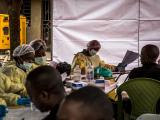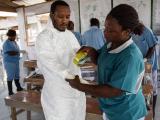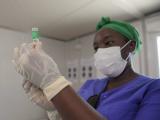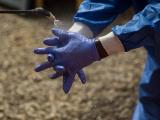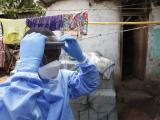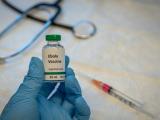May 13, 2003 (CIDRAP News) – The World Health Organization (WHO) today expressed closely guarded optimism that SARS (severe acute respiratory syndrome) can be contained.
"Experiences in a growing number of countries indicate that the disease can be contained, thus supporting WHO's overall objective: to prevent SARS from becoming widely established as another new disease in humans," the organization said in its online update.
SARS is spread through close contact with respiratory droplets in nearly all cases, the WHO said. Consequently, thoroughgoing case detection, patient isolation, and contact tracing can effectively reduce the number of people exposed to the disease, the agency said.
The hopeful assessment came as the WHO reported 111 new cases of SARS and 21 deaths today. The global cumulative total reached 7,548 cases, with 573 deaths. The latest deaths included 10 in mainland China, 7 in Hong Kong, and 4 in Taiwan. The United States had a cumulative total of 343 cases as of yesterday, including 64 probable and 279 suspected cases, according to the Centers for Disease Control and Prevention.
The WHO did not list all the countries where it sees signs of success against SARS, but it cited Singapore as one place where containment efforts appear to be working. The time interval between illness onset and patient isolation there has been reduced from 3 days to 1.4 days, cutting in half the period in which patients can spread the disease to others, officials said. Also, yesterday the WHO praised Singapore's steps to screen air passengers and to quarantine contacts of known SARS patients.
Other places that have achieved some success include Vietnam, Hong Kong, and Mongolia, among others. Vietnam was removed from the list of countries with local transmission on Apr 28. Yesterday, WHO officials said Hong Kong had seen a "steady decline" in the number of new cases, which were in single digits for 8 straight days. On May 10, the WHO removed Mongolia from the list of countries with recent local transmission after it went 20 days with no new cases.
Also on May 10, WHO officials said a cluster of 10 probable cases in the Philippines had been "well contained." Health authorities linked all 10 cases to a patient who returned to the Philippines from Toronto. All the case-patients were isolated in hospitals, and local authorities were confident that all of their contacts had been found and isolated, the WHO said.
The agency said the kinds of measures being used in Singapore are being applied elsewhere, and WHO is collecting data to assess their effectiveness. "Nonetheless, as SARS has clearly demonstrated, a single case admitted to an unprepared hospital can ignite a new outbreak," the WHO statement said. "While trends are moving in an encouraging direction in many areas, even greater focus on control measures is needed if SARS is to be contained globally. WHO experiences with outbreaks of Ebola hemorrhagic fever have repeatedly shown that the initial stages of containment are the most dangerous time to start lowering the level of control."
In China, the state news agency said today that about 10,000 Beijing residents were in isolation because of SARS, down from a peak of about 16,000 last week, according to an Associated Press report. China reported 80 new probable cases today, bringing the nation's cumulative total to 5,086, according to the WHO.
The AP also reported that about 30 people in Nigeria were under medical surveillance because they were believed to have had contact with a visiting Taiwanese businessman who had a suspected case of SARS. The report said the businessman died Feb 28. Six of the 30 contacts developed flu-like symptoms but recovered, according to the report.
In other developments, German researchers reported that a drug now being tested against a rhinovirus that causes the common cold might be "a good starting point" for developing drugs to stop coronaviruses, including the SARS virus, according to an AP report.
Rolf Hilgenfeld of the University of Luebeck said he and his colleagues have a drug that blocks the protease in two coronaviruses—one that causes the common cold and one that infects pigs. The drug is too toxic to use in people, but Pfizer Inc. is testing a similar drug that blocks a rhinovirus protease, according to the report. Hilgenfeld was quoted as saying that the two drugs are very similar in structure, which suggests that the Pfizer drug, called AG7088, could offer a basis for the development of a drug to combat the SARS virus. The German researchers reported their work in an article published online in Science.
See also:
WHO SARS site
http://www.who.int/csr/sars/en/
Abstract of Science report by Hilgenfeld et al
http://www.sciencemag.org/cgi/content/abstract/1085658v1

